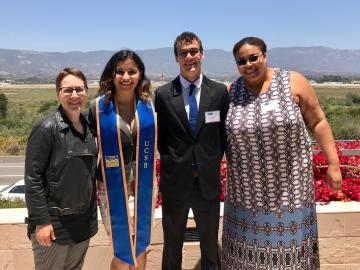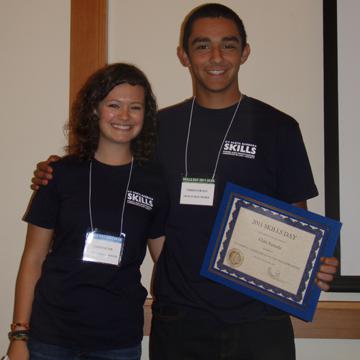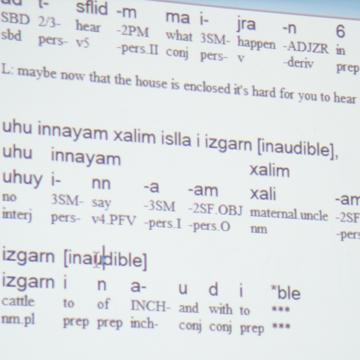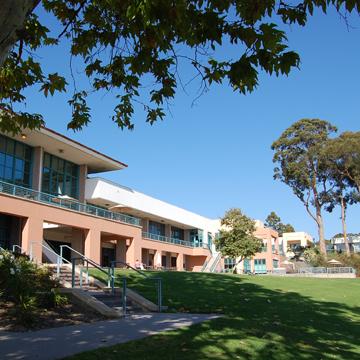Welcome to Linguistics at UCSB!
What is Linguistics?
Why study Linguistics?
What will I study as a linguistics major?
Graduate Studies and Professional Programs
Career Opportunities
Frequently Asked Questions
More Information
Linguistics at UCSB
The Department of Linguistics at UCSB is internationally recognized for its innovative research. It is a world leader in its discourse-functional approach to language, a perspective based on the insight that linguistic structure and use can only be understood by examining language with an eye to its cognitive and interactional characteristics. The faculty is known for its focus on linguistic diversity and its active fieldwork with speakers of a variety of languages, particularly those of the Americas, East Asia, the Himalayas, the Caucasus, and Austronesia. There is also a special interest in varieties of English. In addition, the faculty has particular strengths in the relationship between language and cognition, the computationally-informed study of language in use, and the connections between language, culture, and society.
The department offers excellent undergraduate training, with small classes, personal attention, and a faculty that highly values its undergraduate students. The department provides opportunities for undergraduates to pursue individual study, original research, internships like SKILLS, and participation in faculty and graduate student research projects. Linguistics is ideally suited for interdisciplinary studies; students can use the major to explore particular areas of interest such as psycholinguistics, linguistic anthropology, the documentation of endangered languages, and the structure and history of specific languages. Many students choose to study abroad as part of their undergraduate training in order to develop their skills in another language and to become familiar with another culture.
What is Linguistics?
Language lies at the heart of what makes us human, and linguistics is the study of the structure, history, and use of this fundamentally human capacity. Linguistics focuses on the features all languages share and the myriad ways they differ, the ways language contributes to society and culture, the role of language in human evolution, and in the workings of the human mind.
Linguistics focuses on many different levels of language structure and patterning, from the physics of speech sounds to interactional social behavior and cognition. Linguistics is also centrally concerned with a wide range of historical, psychological, anthropological, sociological, and computational issues involved in language use and its analysis. Linguists study how languages develop and how speech sounds, words, and grammatical structures emerge in particular languages and evolve over time. An area of special emphasis within the undergraduate linguistics program at UCSB is sociocultural linguistics, which includes consideration of how language creates cultural meanings and practices, as well as the ways in which it is used to display speakers’ membership in various social categories.
Why study Linguistics?
What will I study as a linguistics major?
Linguistics is a major that gives you insight into one of the most intriguing aspects of human knowledge and behavior. Majoring in linguistics means that you will learn about many aspects of human language, including sounds (phonetics, phonology), words (morphology), sentences (syntax), and meaning (semantics). It can involve looking at how languages change over time (historical linguistics); how language varies from situation to situation, group to group, and place to place (sociolinguistics, dialectology); how people use language in context (pragmatics, discourse analysis); how to model aspects of language (computational linguistics); how people acquire or learn language (language acquisition); and how people process language (psycholinguistics, experimental linguistics).
In addition, you may be encouraged to complement your linguistic studies with courses in related areas, such as cognitive psychology, cognitive science, philosophy, anthropology, computer science, or communication sciences. You might choose to double major and make your linguistic work part of an interdisciplinary program of study. A secondary specialization in one of the areas just mentioned complements a linguistics major nicely, and can enhance your training and marketability. You may also choose to engage in independent research, such as working as an assistant in a language laboratory, spending time studying and/or traveling abroad, or doing fieldwork. Taking advantage of these opportunities allows you to be more well-rounded and better informed, and will open more doors for you after graduation.
What opportunities will I have with a linguistics degree?
Students who major in linguistics acquire valuable intellectual skills, such as analytical reasoning, critical thinking, argumentation, and clarity of expression. This means making insightful observations, formulating clear, testable hypotheses, generating predictions, making arguments and drawing conclusions, and communicating findings to a wider community. Linguistics majors are therefore well equipped for a variety of graduate-level and professional programs and careers. Some may require additional training or skills, but not all do.
Graduate Studies and Professional Programs
- MA and PhD programs in fields such as linguistics, cognitive science, psychology, computer science, anthropology, philosophy, communication sciences, education, English, cognitive neuroscience, and the study of particular language(s)
- TESOL and applied linguistics programs focused on teaching English to non-native speakers
- Professional programs such as law school, speech pathology, communication sciences and disorders, or library/information science
Career Opportunities
- Work in the computer industry: Training in linguistics can equip you to work on speech recognition, text-to-speech synthesis, artificial intelligence, natural language processing, and computer-mediated language learning.
- Work in education: People with a background in linguistics and education can develop materials for different populations, train teachers, design assessments, find effective ways to teach languagerelated topics in specific communities, or use the language of a community effectively in instruction. Many applied linguists are involved in teacher education and educational research.
- Teach English as a Second Language (ESL) in the United States or abroad: If you want to teach ESL in the US, you will probably need additional training in language pedagogy, such as credentials in Teaching English as a Second or Other Language (TESOL). Many teaching positions abroad require only an undergraduate degree, but at least some specialized training in the subject will make you a much more effective teacher. Linguistics can give you a valuable cross-language perspective.
- Teach at the university level: If you go on to get a graduate degree in linguistics you might teach in departments such as Linguistics, Philosophy, Psychology, Speech/Communication Sciences, Anthropology, English, and departments focused on specific foreign languages.
- Work as a translator or interpreter: Skilled translators and interpreters are needed everywhere, from government to hospitals to courts of law. For this line of work, a high level of proficiency in the relevant language(s) is necessary, and additional specialized training may be required.
- Teach a foreign language: Your students will benefit from your knowledge of language structure and your ability to make certain aspects of the language especially clear. You will need to be very proficient in the relevant language, and you may need additional training in language pedagogy.
- Work on language documentation or conduct fieldwork: Some agencies and institutes seek linguists to work with language consultants in order to document, analyze, and preserve languages (many of which are endangered). Some organizations engage in language-related fieldwork, conducting language surveys, establishing literacy programs, and translating documents of cultural heritage.
- Work in the publishing industry, as a technical writer, or as a journalist: The verbal skills that linguists develop are ideal for positions in editing, publishing, and writing. Work for a testing agency: Linguists help prepare and evaluate standardized exams and conduct research on assessment issues.
- Work with dictionaries (lexicography): The development of good dictionaries requires the help of qualified linguistic consultants. Knowledge of phonology, morphology, historical linguistics, dialectology, and sociolinguistics is key to becoming a lexicographer.
- Become a consultant on language in professions such as law or medicine: The subfield of forensic linguistics involves studying the language of legal texts, linguistic aspects of evidence, issues of voice identification, and so on. Law enforcement agencies such as the FBI and police departments, law firms, and the courts hire linguists for these purposes.
- Work for an advertising company: Companies that specialize in advertising often do extensive linguistic research on the associations that people make with particular sounds and classes of sounds and the kind of wording that would appeal to potential consumers.
- Work for the government: The federal government hires linguists for the Foreign Service, the Federal Bureau of Intelligence (FBI), the National Security Agency (NSA), the Central Intelligence Agency (CIA), the Department of Defense, the Department of Education, and so on. Similar opportunities may exist at the state level.
- Become an actor or train actors: Actors need training in pronunciation, intonation, and different elements of grammar in order to sound like real speakers of a language or dialect. They may even need to know how to make mistakes to sound like an authentic non-native speaker.
Are you still curious about linguistics but not ready to become a linguistics major? Enroll in an introductory-level linguistics course, consider a minor, or take a look at introductory textbooks or course materials. Introductory and advanced linguistics courses often satisfy distribution requirements for other majors. Talk to a linguist! Faculty members in Linguistics departments are usually quite happy to talk with prospective students and answer questions about the major and the field.
Source: LSA
Frequently Asked Questions
Q: How do I declare the major?
A: To declare your Linguistics or Language, Culture, and Society major, you need to fill out a Major Change Form, which you can obtain in the
South Hall Administrative Support Center (SASC) on the third floor of South Hall, in the
College of Letters and Science, or on the
petitions page on this website. After the form has been signed by the Chair of the Department of Linguistics, the form will be forwarded to the College of Letters and Science for final approval.
Q: How can I find out what courses will be offered in upcoming quarters?
A: For courses that are scheduled to be offered, see the department’s
Courses page.
Q: How can I find out about research assistantships, internships, and volunteer opportunities available through the department?
A: These opportunities are announced throughout the year on the linguistics undergraduate email list. To be added to the mailing list, contact the undergraduate advisor. You can also find out about research assistant opportunities by contacting individual faculty or graduate students or through the
Faculty Research Assistant Program Directory.
Courses
The most-up-to-date schedule information is available to currently enrolled students on GOLD and to the general public on Curriculum Search. The complete class schedule for all departments by quarter is available for PDF download through Office of the Registrar. The undergraduate course offerings of the Department of Linguistics for the year are available for download here. Course descriptions for all linguistics courses are available in the General Catalog.







